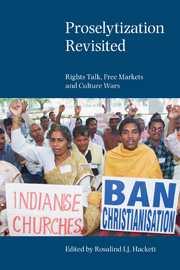Book contents
- Frontmatter
- Contents
- Preface and acknowledgements
- Contributors
- Revisiting Proselytization in the Context of Rights Talk, Free Markets and Culture Wars
- Section I
- Section II
- Section III
- Buddhism and the Politics of Conversion in Sri Lanka
- Merit and the Search for Inner Peace: the Discourses and Technologies of Dhammakaya Proselytization
- Asia's Antioch: Evangelica Christianity and Proselytism in Singapore
- False Consciousness and the Jargon of Authenticity: Religion and Nationalism in the Christianised Lowland Philippines
- Salvation through Secular Protest: the Development of Falun Gong Proselytization
- The Social and Legal Context of Proselytization in Contemporary Japanese Religions
- Section IV
- Section V
- Index
The Social and Legal Context of Proselytization in Contemporary Japanese Religions
from Section III
- Frontmatter
- Contents
- Preface and acknowledgements
- Contributors
- Revisiting Proselytization in the Context of Rights Talk, Free Markets and Culture Wars
- Section I
- Section II
- Section III
- Buddhism and the Politics of Conversion in Sri Lanka
- Merit and the Search for Inner Peace: the Discourses and Technologies of Dhammakaya Proselytization
- Asia's Antioch: Evangelica Christianity and Proselytism in Singapore
- False Consciousness and the Jargon of Authenticity: Religion and Nationalism in the Christianised Lowland Philippines
- Salvation through Secular Protest: the Development of Falun Gong Proselytization
- The Social and Legal Context of Proselytization in Contemporary Japanese Religions
- Section IV
- Section V
- Index
Summary
A century ago proselytization in Japan was most commonly associated with the intrusive presence and evangelistic activities of Christian missionaries from Europe and North America. For the past several decades in Japan, however, it has usually been connected with the recruitment activities of controversial new religious movements. Soka Gakkai, Jehovah's Witnesses, the Unification Church, Aum Shinrikyo, and Honohana—often referred to as “cults” by representatives of established religions and Japanese lawyers’ association—are just some of the religious organizations that have attracted regular media attention. The followers of these and other groups have actively engaged in membership recruitment in a variety of public places, including train stations, parks, and busy commercial streets. It has not been unusual for individuals to be stopped at the crowded entrance of a train station by dedicated followers and offered purification rituals (okiyome) on the spot, in addition to literature, invitations to attend a meeting or seminar, or asked to make a financial donation to some worthy cause promoted by the group. Some religious movements (Seicho no Ie and the Jehovah's Witnesses, for example), are widely known for their outreach strategy of making regular home visits in neighborhoods throughout Japan.
Media coverage of such new religious movements in recent years has been so extensive that it is easy to lose sight of the fact that the history of Japanese religion has been intertwined with various forms of proselytization for centuries.
- Type
- Chapter
- Information
- Proselytization RevisitedRights Talk, Free Markets and Culture Wars, pp. 321 - 338Publisher: Acumen PublishingPrint publication year: 2008



